- Home
- Steven Brust
The Phoenix Guards Page 40
The Phoenix Guards Read online
Page 40
“I understand. And next?”
“You are to be given four meals every day, which meals are to be served at the eighth hour past midnight, again at the thirteenth, then at the third hour past noon, and at the eighth hour past noon, and which meals will consist of roasted meats, fresh bread, any fruits which are in season, along with suitable wine; and you are in addition to be allowed two hours each day in which to exercise in the yard, with said exercise to begin at exactly noon.”
“That is sufficient for me, I think, the more so as the cell is large enough for calisthenics, if these are not forbidden.”
“Not in the least.”
“Well, and next?”
“You must not speak, even to me, of whatever crime brought you here; these are particular orders for you and your friends, and do not apply to other prisoners.”
“Very well, then, I understand. What else?”
“Those are the only restrictions, madam.”
“Very well, but may I say something?”
“Of course, as your host, you may tell me anything at all, so long as it relates to your accommodations.”
“Well, I must tell you that this cell displeases me.”
“How, it displeases you? In what way?”
“Oh, several ways.”
“Well, perhaps we can see about another, my lady.”
“Oh, that isn’t necessary, this one can be put in good order, I think.”
“Well, let us see, then, what needs to be done.”
“First, we need a little wood for the fire.”
“In the summer?”
“Yes. My companion suffers from the chill.”
“How?” said Tazendra. “The chill? I suffer from no chill.”
Kathana shot Tazendra a looking imploring her to keep silent, and said, “Yes, yes, the chill. She doesn’t realize it herself, my good Guinn, but she has been shivering in a most alarming manner.”
“In fact,” said Tazendra, “I do feel slightly cold.”
“There, you see how it is? For her health, a fire is indispensable.”
“Well, as you are a lady, you are allowed nine fagots of wood each day, and bark and twigs as needed. This is generally only granted when the weather is cold, but there is no rule that says you may not have it now.”
“Then you will see to it?”
“I will do so at once.”
“We shall be in your debt.”
“So, that is the fire seen to. What else?”
“Well, next, the walls are not clean to my standards.”
“Ah, ah, you are fastidious?”
“It is a failing, but after all, we cannot change what we are.”
“Well, that is true. But the servants, you perceive, are all busy.”
“Well, then, don’t trouble yourself about the servants; if you supply me with a bucket of water and a scrub-brush, I will clean them myself.”
“Well,” said Guinn, “there is no difficulty in that. What next?”
“That is all, my dear jailer. If you could supply these things, well, I will be in your debt, I promise you.”
“I will attend to them at once.”
When the jailer had gone, Tazendra said, “I assure you, Kathana, I have no notion at all of what you are about.”
“Oh, it is not such a great thing, but, as we may be here for some time, I must find amusement where I can.”
“How, it amuses you to send our jailer for a pail of water and a few fagots?”
“No, but it will amuse me to get them.”
“Why is that?”
“You will see by and by.”
The jailer returned with the water, brush, and the wood. Kathana, after thanking him, lost no time in starting a small fire, which, because of its size, did not make the cell intolerably hot. When the fire was well going, she at once applied the brush and the water to the walls, with a thoroughness that indicated she may indeed have been a charwoman in some previous lifetime. Tazendra soon became bored with watching her, and so, for no other reason, called for a second brush, with which, upon being given it, she began to work with the Dragonlord in making the walls fairly shine.
When this had been done, the jailer returned to collect the bucket and brushes. Kathana begged to be allowed to keep the bucket, which she pretended made a more comfortable chair than the pallet. Guinn allowed her to do so, and, when he had gone, she gave a satisfied smile.
“Well?” said Tazendra. “And now?”
“Now, observe. Do you see these?”
“They seem to be a few bristles from the brushes.”
“Exactly. And this?”
“A piece of straw from your pallet.”
“Well, observe what I am doing.”
“You are pouring a small quantity of our drinking water into the bucket.”
“And now?”
“You are adding ash from the fire, thus rendering the water unfit to drink.”
“Exactly. And now?”
“Now you are dipping the straw into the water, and—the Orb! You are drawing on the walls!”
“Exactly. It will make the time pass quickly, don’t you think?”
“You are as clever as, as Khaavren! And that is no small thing, for I know of no one more clever than he is.”
Kathana bowed, and offered straw and bristles to Tazendra, who said, “But I do not paint.”
“Well, but this is, as you yourself have remarked, more akin to drawing, and, by the gods, everyone draws a little.”
“Well, you are right, and I shall be honored to draw with you. Only—”
“Yes?”
“What shall we draw?”
“Why, scenes depicting our experience in the last few weeks.”
“Well, yes, we could do that.”
“We more than could, we ought to.”
“And the reason, good Kathana?”
“The reason is that someone may ask about these drawings, and we will then tell him, and in this way, word might get out of our predicament.”
“It does not seem likely.”
“With this I agree. But then, have you a better plan?”
“I admit that I do not.”
“Well, and then?”
“Then, my dear Baroness, let us draw.”
Accordingly, the two women at once set to work to make the cell, if not more beautiful, at least more interesting, and to amuse themselves in the meantime.
Neither Uttrik nor Pel had the least interest in the cell they occupied. Pel took the opportunity to question his jailer, first, about the conditions under which they were incarcerated, next, upon the goings-on in the city, such as the jailer might know. As Pel was both clever and charming, he accordingly found out much more than the jailer realized. As for Uttrik, he was a campaigner, and, as such, knew how to make the time pass under circumstances when he could do nothing else; accordingly, he slept.
And let us not forget Mica, who, not being a gentleman, was imprisoned in a room with a score of Teckla, many of them ruffians of one sort or another, as well as a good number of drunkards, tax-evaders, and debtors. One might suppose that, of the entire group, he would have been the most miserable, but nothing could be further from the truth. The fact that he wore livery made him of interest to all, and that he wore the livery of a Dzurlord was even more interesting. When we also consider that this clever Teckla was a gifted speaker, and was both willing and able to relate to his fellow-prisoners the details of the adventures he had been a part of, we may see that his status soon rose directly to the top of prison hierarchy. He enjoyed this status with the honest pleasure a Teckla always takes in simple enjoyments, and thus, though he would have preferred to be free, he was, in fact, the happiest of the seven souls who had been incarcerated at the same time.
Yet, what a difference sixty hours can make, when those hours are spent in prison or in jail. To better understand this, we must make clear that there is a difference. Prison is where those who have been sentenced await execution of
that sentence, or take up residency if the judges have condemned them to confinement for a greater or lesser period. Jail, on the other hand, is where those who are arrested but not yet convicted wait for the judges to determine their fate. There is no difference in treatment, nor is there a difference even in location, but the difference in the psychology of the prisoner is everything. While in jail, it is difficult to become resigned; while in prison, it is difficult to hope. For those, like our friends, who did not know in which situation they were, the hours become burdens in increments that would require a mathematician to explain.
By the time they had been in for two days and two nights, Khaavren had given up even trying to remain calm, and Aerich, the coolest of the Guardsmen, was still engaged in crocheting, but his fingers trembled slightly as he worked.
Kathana and Tazendra had quite filled the walls of their cell with studies of each other and reminisces of their recent adventures, and had fallen into the unhappy stage of criticizing their own work, after which it would only be a matter of a short time before they took to criticizing each other’s, with unpleasant results sure to follow.
Pel had become gloomy and silent, and sat brooding upon all the ways his plan might miscarry; he had even taking to chewing his lip. Uttrik, still trying to sleep but no longer able to, turned and moaned and twenty times adjusted the straw in his pallet.
Mica, though still not entirely unhappy, and still enjoying the glory of his status among the other prisoners, had begun to reflect that he didn’t know how long he would be imprisoned, if indeed, he was ever to be released at all, and these thoughts had taken much of the pleasure out of the enthusiasms with which his stories were greeted; stories, moreover, that had nearly run out, for, as our readers ought to be aware by now, such deeds are much briefer in the telling than in the doing.
It was at just this point that Khaavren was disturbed—if such a word may be used in the case of a gentleman to whom any break in the dreary itinerary was a relief—by the arrival of Guinn, who informed Khaavren that he ought to accompany him to a chamber of questions, where a certain lady wished to speak with him.
It came to his mind that perhaps the lady was Illista; he therefore accompanied Guinn with such alacrity that the Iorich was forced to hurry to keep up with him, and there is no doubt that Khaavren would have left him behind if the Tiassa had known where to go. Guinn, therefore, pointed out the room to him, indicated that he should enter at once, and explained that he would wait outside until the interview was at an end.
In this instance, Khaavren was not mistaken; upon being admitted to the questioning room, he saw Illista herself, who was looking at him with an expression of indescribable tenderness. Her toilette, it must be said, ill became her surroundings, for she had put on a blue ball-gown, with a lace collar and high shoulders that set off her graceful neck and wide eyes, while on her feet were the sort of dainty slippers that would belong rather to a parlor than a prison, yet all of this, as far as Khaavren was concerned, only increased her charm, and in an instant all of the emotions which she had first inspired in him, and which had, perhaps, faded slightly from absence, came roaring back like the waves of the Sundering Beach.
He rushed forward, and threw himself at her feet and covered her hands with a hundred kisses, while murmuring a thousand endearments. After allowing these protestations of his devotion to continue for some few moments, Illista bid Khaavren rise, and said, “Well, I had hoped you might be here.”
“How, you had I hoped I might be here? In prison?”
“That is, I meant that I had hoped to able to find you, and, since you were nowhere else, I had hoped that I might have the chance to speak with you.”
“Well, and you have that chance, and I, I have the chance to see you.”
“Well, and so you do. But we haven’t much time, and there are matters I wish to communicate to you.”
Khaavren frowned. “Then you didn’t come here to see me?”
“Well, yes, that first, and other things after.”
“Other things? Such as, I hope, my release?”
“Yes, yes, that is what I intend, and, if you do what I say, I hope it will have that happy result.”
“How, do you what you say?”
“Well, haven’t you said you would help me?”
“I did, and, moreover, I have done so, or nearly. Kathana, had we not been arrested for reasons of which I am entirely ignorant, was about to surrender herself to His Majesty. You understand, then, that the commission with which you entrusted me was, if not entirely successful—”
“Oh, that is of no consequence now.”
“What? Of no consequence?”
“Exactly.”
“You no longer care about whether your friend has been arrested?”
“Oh, I care, it is merely that things have changed.”
“How, changed?”
“We now have other matters to consider.”
“What other matters, then?”
Illista frowned, as if she feared to say too much, or didn’t wish to say more than she had to in order to accomplish her objective. “Tell me first about your mission. You say Kaluma returned with you?”
“Indeed, yes, and she is in this very prison; no doubt, if you have managed to gain entry to see me, you could arrange to see her as well.”
“Yes, yes, I will certainly do so. But, you were saying?”
“I? What was I saying?”
“That is what I am asking you.”
“Well, it must have been about the mission with which you entrusted me.”
“Yes, that was it.”
“Well, we have returned with Kathana, who is a charming lady—”
“Is she?”
“What, you don’t know? I thought she was your friend.”
“Well, yes, I know that she is charming. But what else?”
“What else? Well, she is also brave, and tolerably quick-thinking, and—”
“No, that is not what I meant to ask.”
“Well?”
“What else about your mission?”
“Oh, well, we have secured peace with the Easterners, and—”
“What, peace?”
“Exactly; we have concluded a treaty with them.”
“Upon what terms?”
“Well, in part they must surrender Sandyhome to the Empire—”
“What?” cried Illista, in great distress. “They agreed to that?”
“They insisted upon it as a condition.”
“But then—” she interrupted herself in order to bite her lip, either to keep herself from speaking or in response to some great emotion.
“Well?” said Khaavren, becoming more and more curious. “But then—”
“Oh, it is nothing.”
“My dear Illista, you have now said that several times, and, if you will permit me to speak—”
“Oh, yes, speak freely.”
“Well, it seems from the expression on your countenance that all of these nothings, when taken together, amount to a great deal.”
“Perhaps you are right.”
“It also seems as if you are in some distress.”
“What, I?”
“Well, perhaps I am in error. But, if you are—”
“Well, if I am?”
“Then I hope you will tell me what I can do, for, if I am to be released from here soon, I will once more have the freedom to throw myself into the fire in order to serve you.”
Illista smiled at this and said, “Then, do you love me a little?”
“Oh, you know that I do!”
“You will do what I ask of you, then?”
“Anything!”
“Then perhaps you can help me.”
“I can imagine no greater happiness than that. Only—”
“Yes?”
“You must tell me what I am to do.”
“Oh, you may rest assured, I will tell you.”
“Then I am ready to obey.”
�
�Without question?”
“Without question.”
“No matter what you must do?”
“Anything!”
“So much the better.”
“Well, but tell me, for I am dying to know.”
“This is it, then: you must kill a man.”
“What, that is all? Cha! Once I am free, the thing is easily done.”
“You will do so, then?”
“For you, with the greatest pleasure.”
“Ah, that’s all right then.”
“Has he insulted you?”
“Yes,” she said quickly. “That is it. He has insulted me, in a most cowardly manner.”
“Well, you have then only to name him, and I will find him and I will say, ‘You have offended the Lady Illista, you will die now,’ and then, by the Light, I will strike him through the heart,” and, as he spoke, he made a pantomime of executing exactly the thrust of which he spoke.
“Well,” said Illista, “but suppose he is far from here?”
“Cha! That is of no consequence; I have just returned from the Eastern Mountains, I could go back, if necessary.”
“So much the better,” said Illista.
“And his name?”
“What if it is someone who is known to you?”
“Well, then he will be that much easier to find.”
“And you will find him, and kill him?”
“I have said so, I say it again. What is his name?”
“Adron e’Kieron.”
“How, him?” said Khaavren, staring in amazement. “The protector of your friend, Kathana.”
“Oh, he is a base coward, I assure you.”
Khaavren frowned, endeavoring to clear up the confusion of his mind. “Well, but, are you sure?”
“Sure? I think I should know when I have been insulted.”
“But, how did he insult you?”
“You said you would ask no questions.”
“Well, that is true.”
“And so?”
Khaavren frowned, and, for the first time, certain questions came into his mind. That Adron could have insulted Illista did not startle him, for anyone can feel insulted by anything; but he had seen Adron, and the thought that he was a coward was difficult for Khaavren to entertain. And yet, to think ill of Illista was beyond him. For a moment he was completely befuddled, but this is a condition which can never exist for long within a mind like Khaavren’s, a mind which acts like a fallow field, in which it is only necessary for a seed to touch it before this seed will sprout, although with what fruit is not always apparent.

 Phoenix
Phoenix Tiassa
Tiassa The Lord of Castle Black
The Lord of Castle Black To Reign in Hell: A Novel
To Reign in Hell: A Novel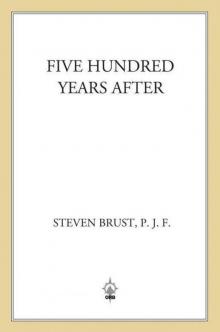 Five Hundred Years After (Phoenix Guards)
Five Hundred Years After (Phoenix Guards) The Book of Dzur: Dzur ; Jhegaala
The Book of Dzur: Dzur ; Jhegaala The Paths of the Dead
The Paths of the Dead Jhegaala
Jhegaala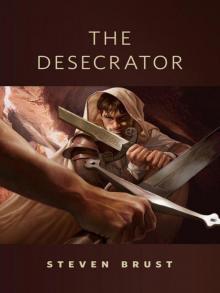 The Desecrator: A Tor.com Original
The Desecrator: A Tor.com Original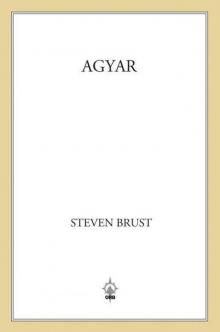 Agyar
Agyar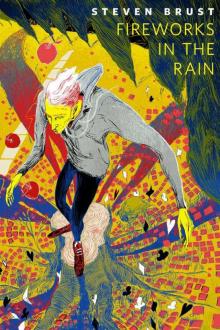 Fireworks in the Rain
Fireworks in the Rain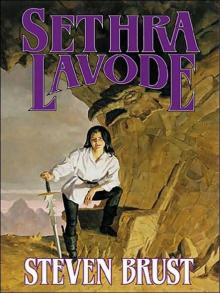 Sethra Lavode
Sethra Lavode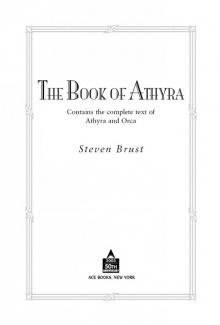 The Book of Athyra
The Book of Athyra Yendi
Yendi Good Guys
Good Guys The Book of Jhereg
The Book of Jhereg Cowboy Feng's Space Bar and Grille
Cowboy Feng's Space Bar and Grille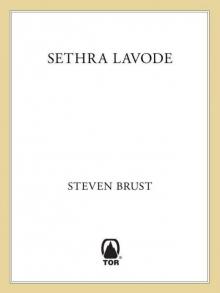 Sethra Lavode (Viscount of Adrilankha)
Sethra Lavode (Viscount of Adrilankha) My Own Kind of Freedom
My Own Kind of Freedom Dzur (Vlad Taltos)
Dzur (Vlad Taltos) The Lord of Castle Black: Book Two of the Viscount of Adrilankha
The Lord of Castle Black: Book Two of the Viscount of Adrilankha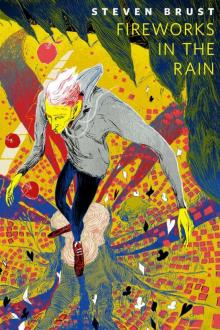 Fireworks in the Rain: A Tor.Com Original
Fireworks in the Rain: A Tor.Com Original To Reign In Hell
To Reign In Hell Issola
Issola Orca
Orca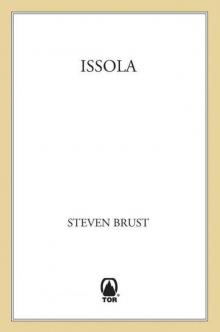 Issola (Vlad Taltos)
Issola (Vlad Taltos) Five Hundred Years After
Five Hundred Years After The Phoenix Guards
The Phoenix Guards Taltos
Taltos![[Vlad Taltos 06] Athyra Read online](http://i1.bookreadfree.com/i1/03/24/[vlad_taltos_06]_athyra_preview.jpg) [Vlad Taltos 06] Athyra
[Vlad Taltos 06] Athyra Vallista--A Novel of Vlad Taltos
Vallista--A Novel of Vlad Taltos The Incrementalists
The Incrementalists![[Vlad Taltos 04] Taltos Read online](http://i1.bookreadfree.com/i/03/24/[vlad_taltos_04]_taltos_preview.jpg) [Vlad Taltos 04] Taltos
[Vlad Taltos 04] Taltos![[Vlad Taltos 03] Teckla (v 1.1) Read online](http://i1.bookreadfree.com/i1/03/27/[vlad_taltos_03]_teckla_v_1_1_preview.jpg) [Vlad Taltos 03] Teckla (v 1.1)
[Vlad Taltos 03] Teckla (v 1.1) The Book of Taltos
The Book of Taltos The Paths of the Dead (Viscount of Adrilankha)
The Paths of the Dead (Viscount of Adrilankha) Jhegaala (Vlad Taltos)
Jhegaala (Vlad Taltos) Hawk (Vlad)
Hawk (Vlad)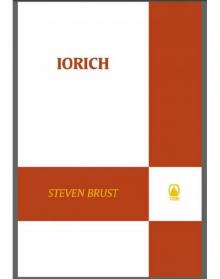 Iorich
Iorich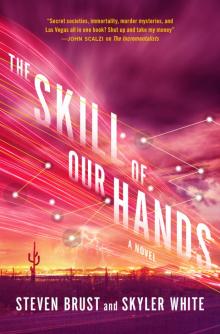 The Skill of Our Hands--A Novel
The Skill of Our Hands--A Novel Brokedown Palace
Brokedown Palace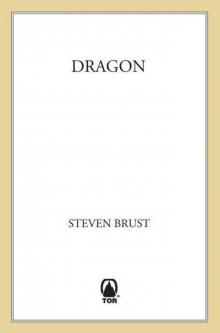 Dragon (Vlad Taltos)
Dragon (Vlad Taltos) Dragon
Dragon Athyra
Athyra Teckla
Teckla Dzur
Dzur